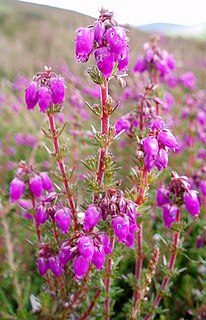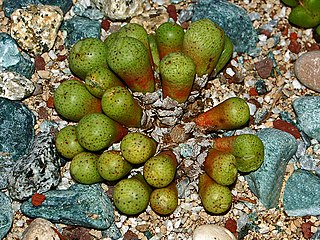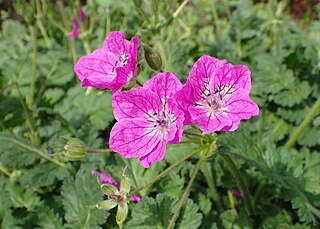
The Royal Horticultural Society (RHS), founded in 1804 as the Horticultural Society of London, is the UK's leading gardening charity.

Petunia is genus of 20 species of flowering plants of South American origin. The popular flower of the same name derived its epithet from the French, which took the word petun, meaning "tobacco," from a Tupi–Guarani language. An annual, most of the varieties seen in gardens are hybrids.

Weigela is a genus of between six and 38 species of deciduous shrubs in the family Caprifoliaceae, growing to 1–5 m (3–15′) tall. All are natives of eastern Asia. The genus is named after the German scientist Christian Ehrenfried Weigel.

Erica cinerea, the bell heather, is a species of flowering plant in the heath family Ericaceae, native to western and central Europe.

The Award of Garden Merit (AGM) is a long-established annual award for plants by the British Royal Horticultural Society (RHS). It is based on assessment of the plants' performance under UK growing conditions.

Kerria japonica, commonly known as Japanese rose or Japanese kerria, is a deciduous shrub in the rose family Rosaceae, native to China, Japan and Korea. It is named after William Kerr, who introduced the cultivar 'Pleniflora'. It is the sole species in the genus Kerria.

Juniperus squamata, the flaky juniper or Himalayan juniper, is a species of coniferous shrub in the cypress family Cupressaceae, native to the Himalayas and China
The Victoria Medal of Honour (VMH) is awarded to British horticulturists resident in the United Kingdom whom the Royal Horticultural Society Council considers deserving of special honour by the Society.

RHS Garden Hyde Hall is a public display garden run by the Royal Horticultural Society in the English county of Essex. It is one of five public gardens run by the society, alongside Wisley in Surrey, Harlow Carr in North Yorkshire, Rosemoor in Devon, and Bridgewater in Greater Manchester.

Erodium is a genus of flowering plants in the botanical family Geraniaceae. The genus includes about 60 species, native to North Africa, Indomalaya, the Middle East, and Australia. They are perennials, annuals, or subshrubs, with five-petalled flowers in shades of white, pink, and purple, that strongly resemble the better-known Geranium (cranesbill). Cultivated plants are known as filarees or heron's bill in North America, whereas in the British Isles they are usually called storksbills.

Disporum is a genus of about 20 species of perennial flowering plants, found in Asia from northern India to Japan, south to Indonesia and north into the Russian Far East.

Symphyotrichum ericoides, known as white heath aster, frost aster, or heath aster, is a species of flowering plant in the family Asteraceae native to much of central and eastern North America. It has been introduced to parts of Europe and western Asia.

Symphyotrichum lateriflorum is a species of flowering plant in the aster family (Asteraceae). Commonly known as calico aster, starved aster, and white woodland aster, it is native to eastern and central North America. It is a perennial and herbaceous plant that may reach heights up to 120 centimeters and widths up to 30 cm (1 ft).

Calamagrostis arundinacea is a species of bunch grass in the family Poaceae, native to Eurasia, China and India. Under its synonym Calamagrostis brachytricha it has gained the Royal Horticultural Society's Award of Garden Merit.

Eriocapitella hupehensis, a species of flowering plant in the buttercup family Ranunculaceae, is native to Asia. The specific epithet hupehensis, which means "from Hupeh province, China", refers to a region where the species is known to occur. In Chinese, it is called dǎ pò wǎn huā huā (打破碗花花), which means "broken bowl flower".

Conophytum jucundum is a species of succulent plants belonging to the family Aizoaceae. As its synonym Conophytum gratum, the pleasing cone plant, it has gained the Royal Horticultural Society's Award of Garden Merit.

Eriocapitella × hybrida is a hybrid of flowering plants in the buttercup family Ranunculaceae. The parents of the hybrid are E. japonica and E. vitifolia. Cultivars of the hybrid are commonly known as Japanese anemone hybrids.

Erodium glandulosum, called the black-eyed heron's bill, is a species of flowering plant in the genus Erodium, native to the Pyrenees. It has gained the Royal Horticultural Society's Award of Garden Merit.

Erodium manescavi, called the garden stork's-bill, large purple storksbill, Manescau storksbill, Manescau heronsbill and showy heron's bill, is a species of flowering plant in the family Geraniaceae. It is native to the Pyrenees mountains of France, and has been introduced to Austria. As Erodium manescavii it has gained the Royal Horticultural Society's Award of Garden Merit.


















